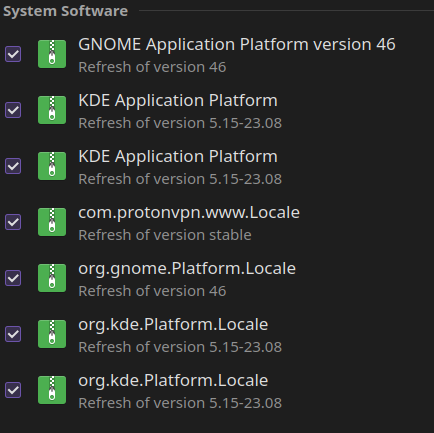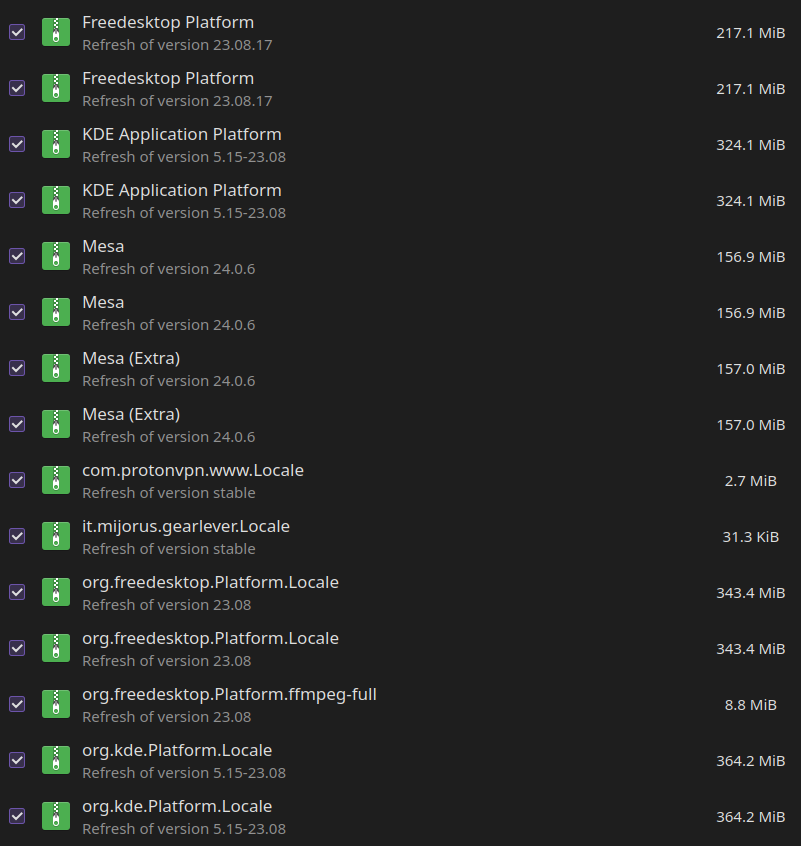You know if you use temple_os you don’t have to worry about updates?
It is impossible to update perfection
You do have to worry about some things though. I couldn’t say what those things are, but I have a hunch that temple_os users have some pretty unique worries.
Help! My boot loader got corrupted by SATAN!
You need to excorcise those daemons!
Oh yes. Like the fucking CIA and the FBI.
WTF are all these “Refresh of version…” updates? Am I unfresh? Do I need to bathe? (probably)

Edit: It’s like it saw my post from yesterday and said “oh you like that do you?”

I had been wondering about that too so I looked it up and apparently it’s just what discover displays whenever there’s an update that doesn’t change the version number which is things like rebuilds with a newer compiler. Very confusing wording, I feel like just “update of version [version]” would be less confusing
This is why semver is a thing. If a program is released under 1.1.x, and then recompiled with a new compiler, then it can be 1.1.y where y > x
A recompilation or repackaging of Linux 6.6.6 is still Linux 6.6.6
Yeah, but in the context of flatpak isn’t the distribution managed by the developer themselves? Also, in the distro release version case, they usually add something distro specific to differentiate it.
isn’t the distribution managed by the developer themselves?
No, most often it’s not.
Valve literally just had a fiasco with them not long ago with them falsely marking steam as verified when Valve are not the ones packing the Flatpak.I’m not sure about specific packages, but in general a packager may not want to increase the upstream version even if they can do it themselves - for example, they may have made some mistake in the packaging process.
Yes, and hence my comment on flatpak which turns out is false (that the upstream developer is usually the distributor/packager too). And the other still applies, distro usually adds a specific tag anyway for their refresh. Like that one time xz on rolling debian was named something x.y.z-really-a.b.c.
I think flatpak packagers should also append the specific tag too if that is the case. Like, x.y.z-flatpak-w where w can be the build release version
deleted by creator
openSUSE, the by far most reliable rolling release distribution. Reliable packages are more important than a bit of data traffic.
Yes.
I mean, I just set my system to only check for updates once a week.
There’s no real reason to install every update, the second it’s available. If there’s a big security fix you should get asap, you’ll hear about it.
Yeah I think I’m gonna do that, thanks
That little up arrow in the sys tray might as well be a gun to my head
Which is why you reduce the frequency at which the system checks for updates.
Once I get notified it’s irresistible.
At some point I think some devs might be refactoring a switch-case into an if-else and calling it an “update” to troll downstreams.
apparently fools consider a finished app “dead” or “abandoned” if there isn’t a new release every week. so yeah, dev’s will just change a comment to not have their apps shunned
For a correct metric one must multiply the time since last update by the number of open issues
For me if an app doesn’t get updated within 13 months, I’ll look for an alternative, why 13 ? It’s my cursed unlucky number…
Try whatever ublue floats your boat, it all happens in the background, the power of atomic updates baby, if something breaks, just go back to the previous one…
Atomic updates!? I don’t think my PC has the proper radiation shielding for atomic updates…
I get the same messages, despite using uBlue.
It’s because of Flatpak.I disabled the notifications and enabled daily/ weekly auto-updates of Flatpaks, otherwise I would get spammed to oblivion.
enable flatpak-system-update.service if it’s not…works for me.
Flatpak runtimes aren’t part of atomic updates.
but flatpak-system-update.service is a part of ublue
Joke’s on you, I use Arch and already reboot twice a day for updates.
You’re rebooting for updates?? I just use an infinite recursion of chroots.
There’s really no need to update every instance one pops up.
this is why you never go full flatpak
This is the part i dislike like with Fedora compared with Ubuntu. It is so many updates.
But since you can choose the time when to install the updates, there is a less of a problem.
Normally you don’t notice any difference. And updates is much faster to install on Linux in general. Windows eats loads of CPU.
I reboot every day thanks to arch.
This is why I use the LTS edition for my OS
Edit: I’m a dum dum and didn’t know flatpak updates showed up like that.
That doesn’t make any difference to Flatpaks.
Ah, is that what is happening here. I didn’t realise.
Meh. No Flatpak, no worries. And no updates, no new software or security patches.
Speaking of Debian:
No bugfixes? Yes. The software will not be changed to fix a usual bug.
No security patches? No. Security patches are applied.
I have Debian on my servers for a decade or so, and on several workstations. My past experience doesn’t quite reflect that. The Debian guys and gals have always been pretty quick with patching the vulnerabilities. Like outstanding fast.
There is some merit to the bugfixing. But that’s kind of the point of Debian Stable(?!) Like in the meme picture of this post I don’t want updates each day. And I also don’t want the software on my servers to change too much on their own. I know my bugs and have already dealt with them and I’m happy that it now works seamlessly for 6 months or so…
And that’s also why I have Debian Testing on my computer. That gives me sort of an unofficial rolling distro. With lots of updates and bugfixes. I mean in the end you can’t have no updates and lots of updates at the same time. It’s either - or. And we can choose depending on the use-case. (I think the blame is on the admin if they choose a wrong tool for a task.)
Exactly. The Debian team is quite conservative in fixing non-critical bugs in the stable branch, as it may introduce new bugs.
If one wants more up-to-date software, the testing branch is a valid choice or Siduction, if one is brave enough.
Thank god i use XFCE
This is flatpak updates
xfce ftw
new features? We don’t do that here.
Wait what, the newest version has been released december 2022?
The point of my original post was that their update cadence is slower. The point of my followup reply is that they are not devoid of updates, either.
They have a release every 1-2 years, and it’s packed full for various tweeks, improvements, and new features. They fix broken shit, and enhance where it makes sense.
I don’t need my window manager to get fad features, and I don’t need constant updates. It does what I want it to do already.
xfce ftw.
Thank you for spelling “every time” properly, and I’m sorry we’re at the stage where that’s an accomplishment.


















